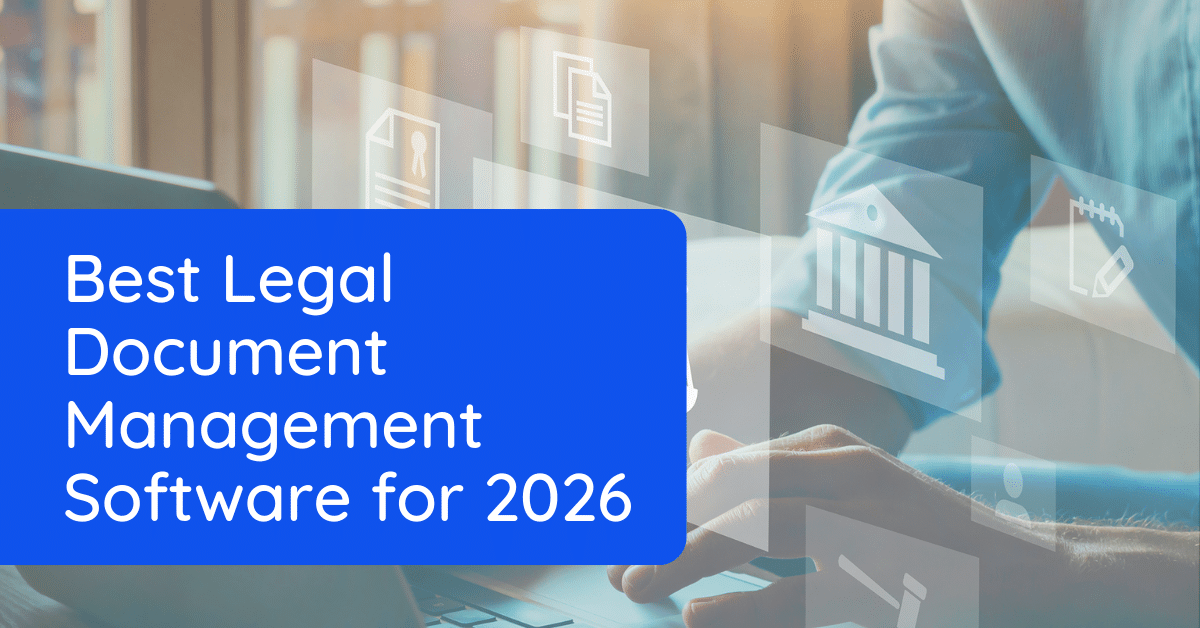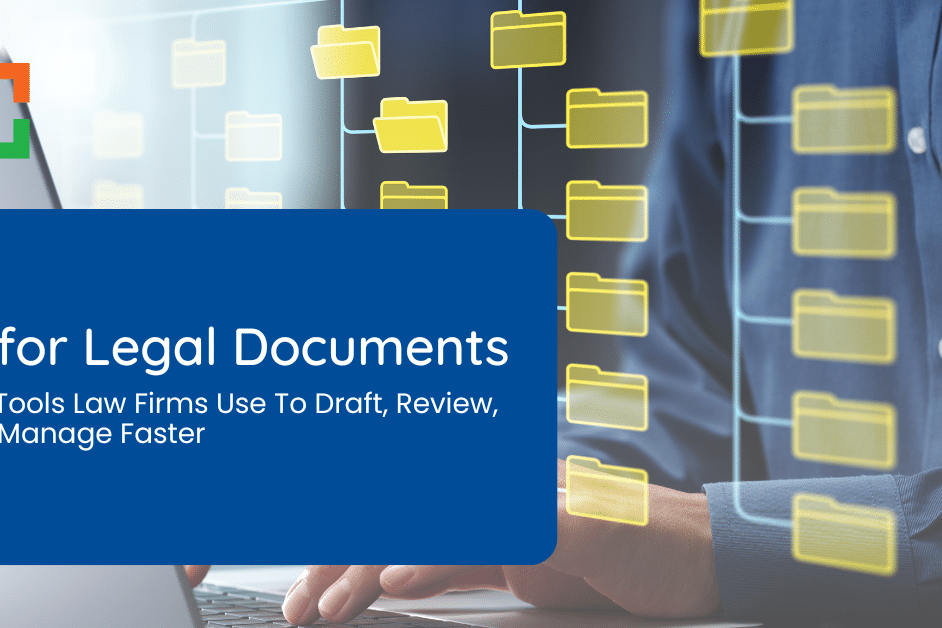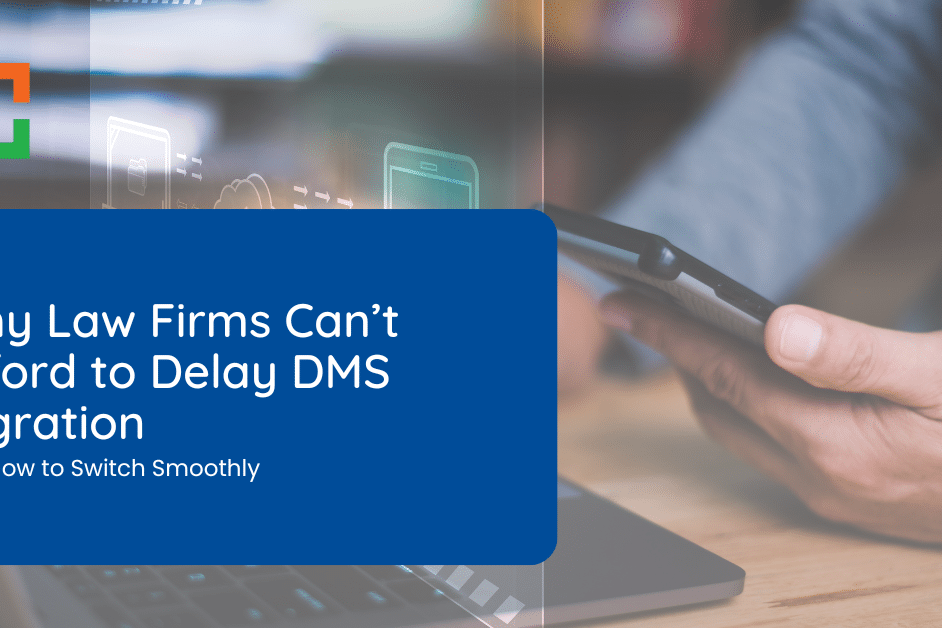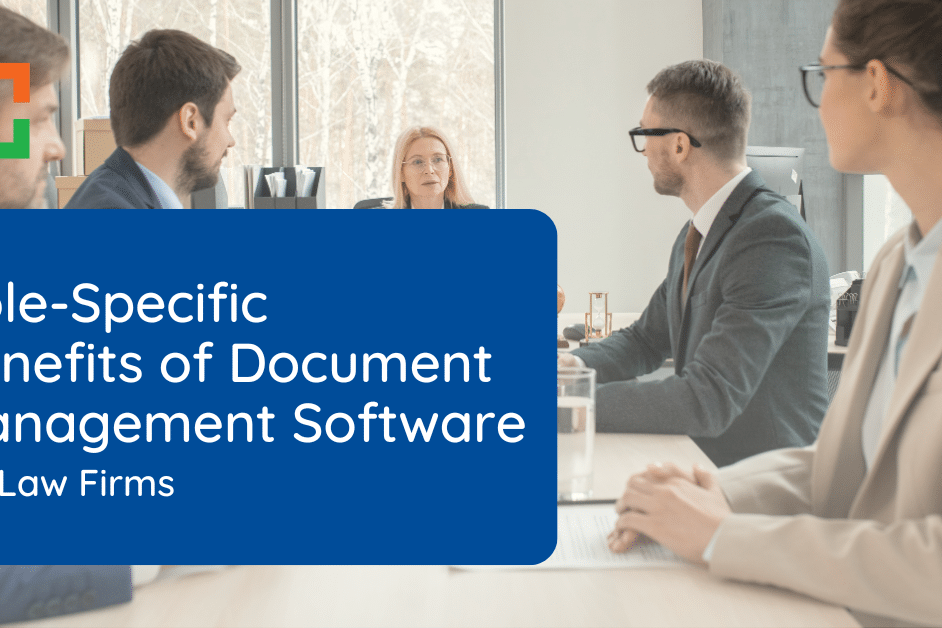Best Digital Signature Apps for Law Firms
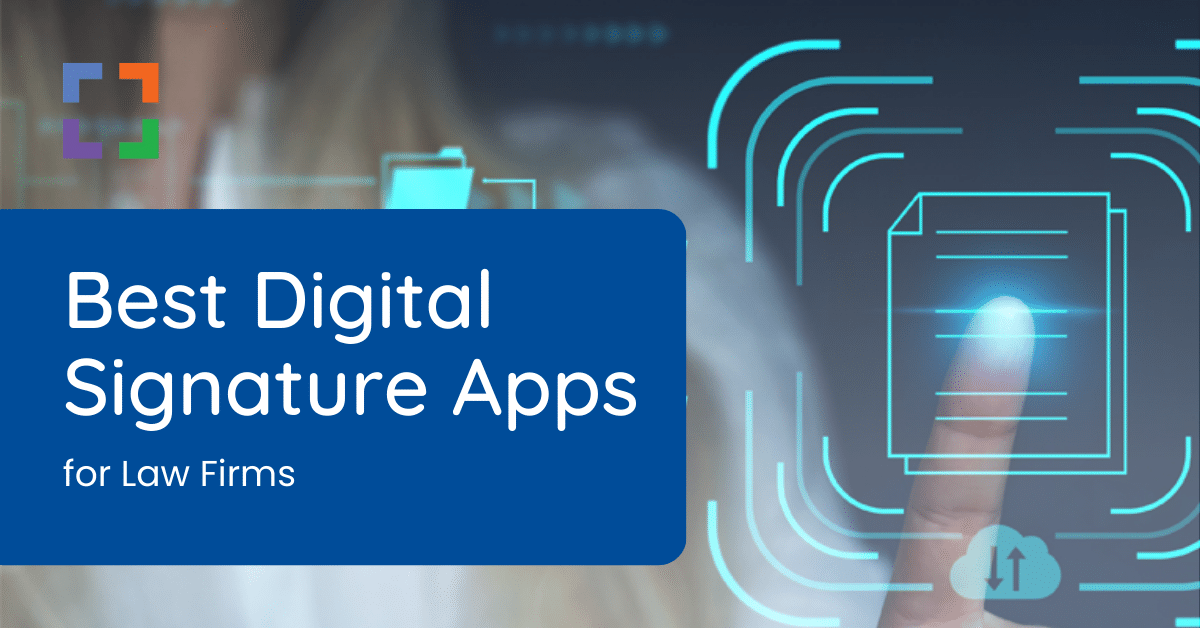
In This Article
Best Digital Signature Software for Law Firms
About Digital Signature Software
- All About Digital Signature Apps for Law Firms
- What Is an E-signature?
- Why Should Law Firms Use Electronic Signatures?
- The Legality of Electronic Signatures
- Validating E-Signatures in Court
- Examples of Documents That Can Be Signed Electronically
- How E-Signing Can Benefit Your Internal Operations
- What Features Should Law Firms Look for in a Digital Signing App?
- Questions to Ask When Selecting a Digital Signature App
- How Much Does Digital Signing Software Cost?
- It’s Time to Explore E-Signing Apps
Best Digital Signature / e-Signature Software for Law Firms
Are you a lawyer looking for the best digital signature software to streamline your processes?
Today, speed and efficiency are everything, so having the right digital signature solution can help you move quickly on critical activities like signing a contract.
We’re here to walk you through the benefits of digital signature technology and give you an in-depth look at the top-rated applications. We break down the benefits and features of each software so you can make the perfect decision for your firm.
The List – Best Digital Signature Apps for Law Firms

DocuSign
Arguably the leading online digital signature platform, great for all industries.
- Type: Stand-Alone Digital Signature App
- Security: ISO 27001:2013, SOC Type 1, Type 2, PCI DSS, APEC PRP, eIDAS, GDPR, BCRS
- Pricing: Standard Plan - $25 / User / Month
HIGHLIGHTS
- DocuSign is the most well-known and widely used digital signature applications, including by law firms.
- DocuSign has the most third-party security and compliance certifications.
- DocuSign has an easy-to-use signing experience, allowing you to drop signature blocks and custom fields to any documents.

Dropbox Sign
Dropbox Sign, formerly HelloSign, is a digital signature application that tightly integrates with the Dropbox suite.
- Type: Stand-Alone Digital Signature App
- Security: ISO 27001:2013, SOC Type 1, Type 2, PCI DSS, GDPR
- Pricing: Essentials Plan - $15 / User / Month
HIGHLIGHTS
- Dropbox Sign, unsurprisingly, integrates into the Dropbox suite of cloud productivity apps.
- Dropbox Sign allows you to create templates that your firm can reuse.
- Dropbox Sign supports a number of Single Sign-On (SSO) platforms.

Formstack Sign
Formstack Sign, formerly Insuresign, is a digital signature application that integrates with the Formstack online form platform.
- Type: Stand-Alone Digital Signature App
- Security: SAS 70 Type 2, FDA, PCI DSS, GDPR
- Pricing: Starter - $18 / User / Month
HIGHLIGHTS
- Formstack Sign has drag and drop fields for ease in creating signable documents.
- Formstack Sign has automation functionality to streamline your processes.
- Formstack Sign has good integrations to incorporate it into your workflow as needed.
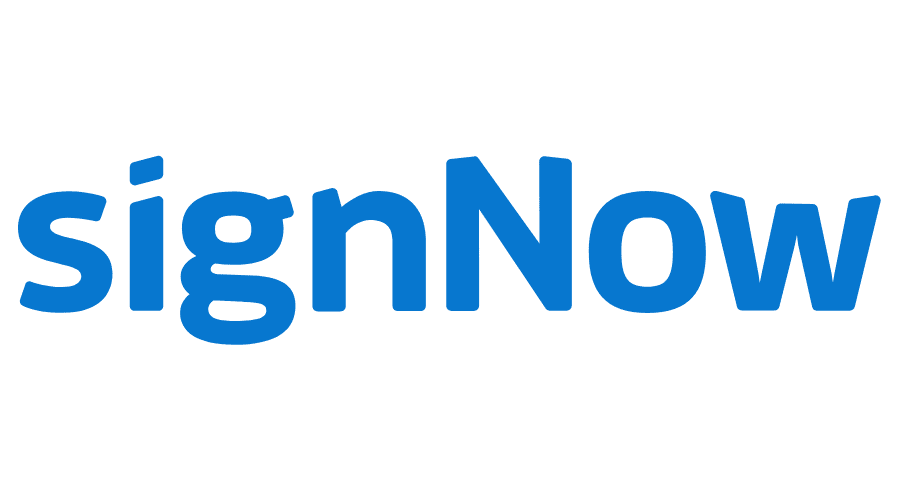
SignNow
SignNow is digital signature software with lightweight form assembly and document automation capabilities, used by law firms and other industries.
- Type: Stand-Alone Digital Signature App
- Security: SOC Type 2, PCI DSS, CFR Part 11, eIDAS, GDPR
- Pricing: Business - $8 / User / Month
HIGHLIGHTS
- In addition to traditional electronic signatures, SignNow includes features to create and reuse document templates.
- SignNow also includes lightweight document automation capabilities, allowing you to create custom document processes.
- SignNow provides an open API, allowing third-party developers to create software that communicates directly with SignNow.

Clio Manage / Clio Grow
Clio Manage and Grow are law practice management, CRM and intake applications respectively with built-in digital signature capabilities.
- Type: Practice Management + Digital Signature Software
- Security: ISO 27001:2013, SOC Type 1, Type 2, PCI DSS, APEC PRP, eIDAS, GDPR, BCRS
- Pricing: Essentials: $69 / User / Month (annual plan)
HIGHLIGHTS
- Clio Manage is powerful practice management software that manages your firm's cases, contacts, calendar, time and billing.
- Clio Grow is Sales CRM and intake software designed to help you sign more clients and streamline intake.
- Both Manage and Grow have inline, integrated electronic signature capabilities.

MyCase
MyCase is law practice management software with integrated digital signature and document workflow functions.
- Type: Practice Management + Digital Signature Software
- Security: SAS 70 Type 2, PCI DSS, GDPR
- Pricing: Basic - $39 / User / Month (annual plan)
HIGHLIGHTS
- MyCase is long-running law practice management software that will manage your firm's clients, cases, tasks, time and billing.
- MyCase includes integrated digital signature features, centralizing these functions in one system.
- MyCase has a very robust client portal, making client communication and document sharing easy and secure.

PandaDoc
PandaDoc allows you to create, sign and distribute documents. It’s used by law firms as well as other industries.
- Type: Stand-Alone Digital Signature App
- Security: SOC Type 2, FERPA, ISO 27001, FedRAMP, DoD CSM, GDPR
- Pricing: Essentials - $19 / User / Month (annual plan)
HIGHLIGHTS
- PandaDoc provides easy-to-use digital signature capabilities.
- PandaDoc also provides lightweight contract management and document automation features.
- PandaDoc somewhat focuses on sales (with its deal-signing features), but can be used to execute any legal document.
About Digital Signature Software for Law Firms
Technology has drastically changed how law firms operate and manage themselves. There’s always a new software option to help with practice management, document management, payment processing, and even legal accounting.
Despite this tech revolution, some things haven’t changed and perhaps never will. That includes the need for good old-fashioned signatures on documents. Signatures will probably always be necessary, but that doesn’t mean they always have to be the pen-to-paper kind.
Today, law firms, clients, courts, county recorders, banks, and other entities are generally more than happy to use electronic signature tools. They help make the signing process easier and more efficient for everyone.
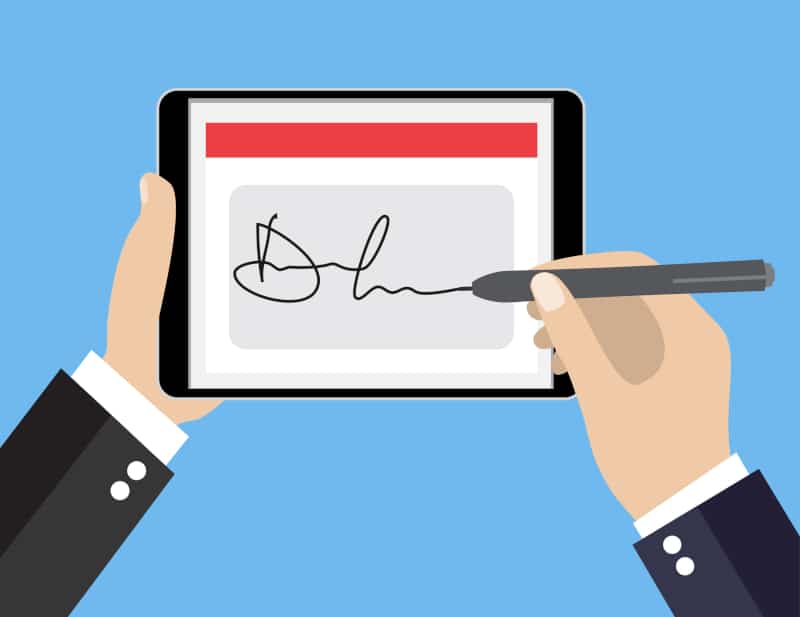
The acceptance of digital signatures has become widespread. Even old-school industries like real estate, which always required wet signatures on documents, have embraced electronic document signing.
In a post-pandemic world where everyone across industries has experienced the convenience of digital signing, it’s unlikely we’ll ever go back.
For law firms, the question is not whether to use digital signature tools but how to choose the one that best fits the firm’s specific needs.
In this article, we’ll talk specifically about digital and electronic signature apps, including:
- What e-signatures are
- Why law firms can benefit from e-sign software
- What makes electronic signatures legally binding
- How to choose the right e-sign software for your firm
What Is an E-signature?
Essentially, an electronic signature is a digital signature that eliminates the need to have people sign documents with pen and paper. E-signatures are gathered using software that employs an algorithm to validate the authenticity and integrity of the information — in this case a signature — being added to the document.
You could think of e-signatures as virtual fingerprints. Like a fingerprint, the digital signature has unique identifiers thanks to the software. This ties the signer’s identity to the document. In other words, e-sign software allows you to know that the document was signed by the right person at the right time.
As we’ll discuss later, the validation aspect is one of the biggest advantages of e-signatures. It’s a major reason why courts have become willing to accept e-signed documents as evidence and even allow certain court filings to be e-signed.
Why Should Law Firms Use Electronic Signatures?
Modern legal practices are under more pressure than ever to deliver exceptional work and client services. Today’s firms are also conscious of other factors, such as environmental concerns, that drive them toward paperless solutions whenever possible. Digital signature apps can help firms address many of these factors.
1. Better Use of Time
Law firms are often tasked with obtaining signatures from many different parties. In the past, this meant scheduling meetings and getting together in person, which in turn meant commuting, sitting in traffic, and parking — things few people enjoy. All of that takes a lot of time for both the lawyer and the signer.
Digital signing apps allow all parties to provide their legally binding signatures without having to spend an hour in the car to get to a lawyer’s office to sign a document. You can spend more time drafting briefs, putting together contracts or preparing for trial with an e-sign tool gathering signatures for you.
2. Paper Reduction
Reducing paper consumption is a big goal for many law firms. Some firms and solo lawyers may even be working from home offices and don’t have space or money for printers and scanners.
Either way, electronically signing documents means less paper and a greener practice. Going green isn’t just good for the environment. It’s also good for business: Clients of today and tomorrow are increasingly sensitive to paper waste and the overall environmental impact of businesses, including law firms.
Using electronic signatures is a good way to show clients that you care about the environment in the same way they do, which helps you build goodwill and long-term loyalty among your client base. This issue will only continue to grow in importance as younger generations mature and come to need legal services in the future.
3. Easier Storage and Filing
Paper documents have to be filed and stored somewhere. It’s easy for a paper document to end up in the wrong drawer. Plus, filing cabinets can take up acres of precious space.
Digital signature apps remove these issues by storing the signatures in the system. The signed documents are then easy to search for and pull up within the span of a few seconds.

Besides eliminating the need to sort through an overstuffed filing cabinet, digitized documents are easier to recover in the event of a natural disaster. For instance, if a fire occurred at your office, you won’t have to worry about losing important signed documents since they’ve been digitized and saved in the cloud.
The Legality of Electronic Signatures
A faster, greener signing option sounds great, but it won’t be of much use unless the signatures are legally binding. Thankfully, e-signatures have been legal in all U.S. states and territories since 2000, when lawmakers passed the Electronic Signatures in Global and National Commerce (ESIGN) Act.
If you’re dealing with a situation where federal law doesn’t apply, then you’ll be happy to know that every state has its own law allowing the acceptance of e-signatures. Forty-nine states have adopted the Uniform Electronic Transactions Act (UETA), while New York has its own e-sign law that functions almost exactly like the UETA.
In Canada, electronic signatures are recognized federally under the Personal Information Protection and Electronic Documents Act (PIPEDA). At the provincial level, several provinces have also adopted e-sign legislation.
Alberta, Ontario, and British Columbia have laws based on the Uniform Electronic Commerce Act of Canada (UECA), while Quebec has its own set of e-commerce laws allowing e-signatures.
What Your Digital Signing App Should Provide to Ensure Legally Binding Signatures
When choosing a digital signing app for your law firm, make sure the solution contains certain features that are required by the ESIGN Act and UETA.
The high-quality apps available today contain the following workflows:
- Ability to demonstrate a clear intent to sign: This can be as simple as an “Accept” button or a field for the user to type their name.
- Consent to do business electronically: The app must contain a consent clause and prompt the user to agree to sign electronically. An “Accept” or similar button is sufficient.
- Opt-out capability: The app should allow users to decline to sign the document electronically and provide instructions on how to sign the document manually.
- Validation/audit trail: The app must keep a record of the steps the user went through to sign the document electronically.
- Ability to send signed copies: All signers should receive a copy of the signed document. Most apps today have features that make this step easy.
- Record retention: E-signature records apps should be able to retain the signature/signed document.
Validating E-Signatures in Court
In court, validating wet signatures tends to be expensive and cumbersome. It involves comparing copies of a person’s known signature with the signature on the document in question. This requires testimony from witnesses and/or handwriting experts.
Such testimony can take a long time to arrange and, in the case of experts, it comes at a financial cost. Despite this testimony, there is also always a chance for human error.
Electronic signatures, on the other hand, are easier to authenticate in court. That’s because most digital signing apps provide summaries of the signing event.
The summary usually includes details such as:
- The identity of the person who requested the signature
- The identity of the signer(s)
- A graphical representation of the signature
- Dates and time stamps showing when the document was sent, viewed, and signed
- IP addresses of those who sent, viewed, and signed a document
This level of detail is simply not possible in the world of wet signatures, where validation boils down to the opinion of a witness or expert. The traceability of e-signatures is one reason courts have been receptive to the use of digital signatures.
Examples of Documents That Can Be Signed Electronically (and Some That Cannot)
Digital signatures are legal everywhere in the U.S. They’re accepted and enforceable on a wide range of business and personal documents.
Here is just a small handful of documents that can typically be signed electronically:
- Insurance policies and insurance claims
- Real estate documents such as purchase agreements, mortgages, and title work (subject to the policies and practices of the lender and county recording office you’re dealing with for your specific transaction)
- Non-disclosure agreements (NDAs)
- Account opening paperwork for checking accounts, credit cards, and other banking products
- Patient intake forms at hospitals and clinics
- Sales contracts
- Employment-related documents like offer letters, new hire paperwork and employee policies
- Corporate liability waivers
- Some types of powers of attorney in some states
While digital signatures are acceptable in many different situations, there are still some documents where electronic signing is not allowed.
Wet signatures are often still required on these items:
- Wills, trusts, and other estate planning documents
- Court filings (always check local rules on e-signatures to avoid possible sanctions)
- Documents notifying someone of foreclosure or eviction
- Notices to terminate life insurance or health insurance policies
- Documents legally required for the transport of toxic substances, pesticides, and other hazardous materials
How E-Signing Can Benefit Your Internal Operations
The use cases above are all examples that you might run into during litigation or a transaction but don’t forget that your firm can also use e-signatures in other contexts.
Whether you’re practicing solo or have staff, you can easily imagine using e-signatures for your operational needs.
For example, e-signed documents could have a role to play in:
- Purchase orders
- Statements of work
- Retainer agreements
- Master service agreements
- Supplier/vendor agreements
- Inventory and audits
- Managing the firm’s policies
- Hiring new associates
What Features Should Law Firms Look for in a Digital Signing App?
E-sign software is used across many industries, so it’s important to choose a solution that has the features most law firms need. Attorneys will want to look for features like these when evaluating electronic signature options.
Data Security
Given the sensitive nature of legal documents, make sure the solutions you’re considering have strong security features. Advanced encryption and two-factor authentication (2FA) should be included.

You may also want to look for a HIPAA-compliant option if you do personal injury or other work that involves medical records. Look for certifications like SOC Type 2, ISO 27001, SAS 70 Type 2, GDPR, and others. Don’t be afraid to ask a tech expert if you need help understanding all the different security certifications.
Document Editing
Look for a solution with a built-in editor if you need to add or remove fields or text from the document. Editors can make correcting mistakes easier than having to obtain a corrected version from somewhere else and then uploading it again for signatures.
Status Notifications
For added convenience, you may want to choose an app that sends you notifications when a document you sent has been viewed, signed, or declined. That way, you can take follow-up action promptly.
Reminders for Signers
People are busy, and they can sometimes forget to sign a document. It may even get buried in their overflowing email inbox. Fortunately, plenty of digital signing apps allow you to send reminders to signers at certain time intervals. This helps you collect the signatures timely and is also great customer service.
Status/Audit Trail
Most of today’s signing apps will build an audit trail showing the status of a document, who has opened it, when they opened it, and the IP address of the openers.
Payment Processing
This is a bit of a luxury feature, but it’s nice to have if you can find an e-sign app that includes it. Built-in payment processing gives your clients another way to pay for your services and do so at the time of signing.
Questions to Ask When Selecting a Digital Signature App
Selecting any technology for your law firm can be a little daunting, and most lawyers don’t have time to be tech experts.
By asking yourself a few simple questions, you can put yourself on the right path toward an electronic signature solution that works for your needs:
- Is it secure? As mentioned in the section above, always keep security in mind from your firm’s perspective and your clients’ perspectives. Clients are increasingly more willing to ask service providers, including law firms, about their security practices, especially with frequent cybersecurity breaches in the news.
- How is the user interface? A solution can be powerful, but no one at the firm will use it if it’s too hard to figure out. Don’t be afraid to get demos of multiple services, and take your time evaluating them. Also, consider taking advantage of any free trial periods. Free trials allow you to use the app and decide whether the user interface (UI) makes the experience logical, intuitive, and easy.
- How well does it integrate with your current practice management software? Ideally, the technologies you choose for your law firm can work together as much as possible. Try to choose an e-signature tool that integrates with your practice management software. This can make client intake easier and streamline other processes for you or your staff.
- Does your practice management software or client relationship management system already have e-sign built in? You may already have e-sign capability waiting for you within your law practice management software or CRM. For example, the LawMatics CRM includes e-signature, as does the Clio practice management solution. Native e-sign solutions contained in these systems may not always have features as robust as a stand-alone e-sign app, but they may be enough for your law firm.
How Much Does Digital Signing Software Cost?
The cost of e-signature solutions varies greatly. Some are free to use. In fact, if e-sign is already built into your practice management or CRM tool, you’re already paying for it.
If you go with a standalone app that isn’t free, you can probably expect to pay anywhere between $15 and $60 a month. Prices tend to be on the higher end for solutions that include two-factor authentication, reminder features, and password protection for documents.
You can also take advantage of free trials offered by many e-signature providers. 30 days is a common trial period for some of the leading services. This is a long enough time to get a sense of what the tool can do and whether it will work for you and your team.

It’s Time to Explore E-Signing Apps
If your law firm isn’t using digital signatures, there’s no better time than the present to get started. There are plenty of competitive options to choose from in the marketplace.
As so many of us have gotten accustomed to working remotely and doing as much as possible online, today’s clients want to be able to sign things electronically. They don’t want to carve hours out of their workdays to come to your office to sign something.
The clients of tomorrow won’t want to sign in person, either. People who’ve grown up with smartphones have always had the world at their fingertips, from food delivery to banking and everything in between. Those are your future clients.
If you ask them to fight traffic to come to your office just to sign a document, they could find it a great inconvenience. Equipping your firm with e-sign capability allows you to meet clients where they are: in the digital world.
As we said at the beginning of this article, the question is not whether law firms should use digital signature technology. The real question is which solution to choose. The legal technology experts at LexWorkplace can help you make the choice.
We’re dedicated to helping law firms use technology to optimize their practices. We take a holistic view of the practice of law and law firm operations. As such, we view e-sign capability as just one essential feature of a modern law firm.
We invite you to explore the comprehensive tech guides we’ve compiled to help law firms understand and embrace various technological options:
- Office 365 for law firms
- MS Teams for law firms
- Email management for law firms
- Cloud security guide
- How to build a law office in the cloud
Document Management Software
Digital signature software is a great way to streamline the process of sending and signing documents. But you’ll also need a system to:
- Organize documents by client/matter
- Search for documents
- Tag and categorize documents
- Manage document versions
For that we recommend Document Management Software. See our list of the best Document Management platforms for law firms.
Related – Best Legal Document Management Software
Explore the best Document Management Systems for law firms.
Looking for Document Management Software?
LexWorkplace:
Modern Document Management for Law Firms
LexWorkplace is document & email management software, born in the cloud and built for law firms. Here’s a quick primer on how it works, or get your free trial to discover LexWorkplace for yourself.
Organize by Client & Matter
Organize documents, email and notes by client or matter. Store and manage all data for a case or project in one place.
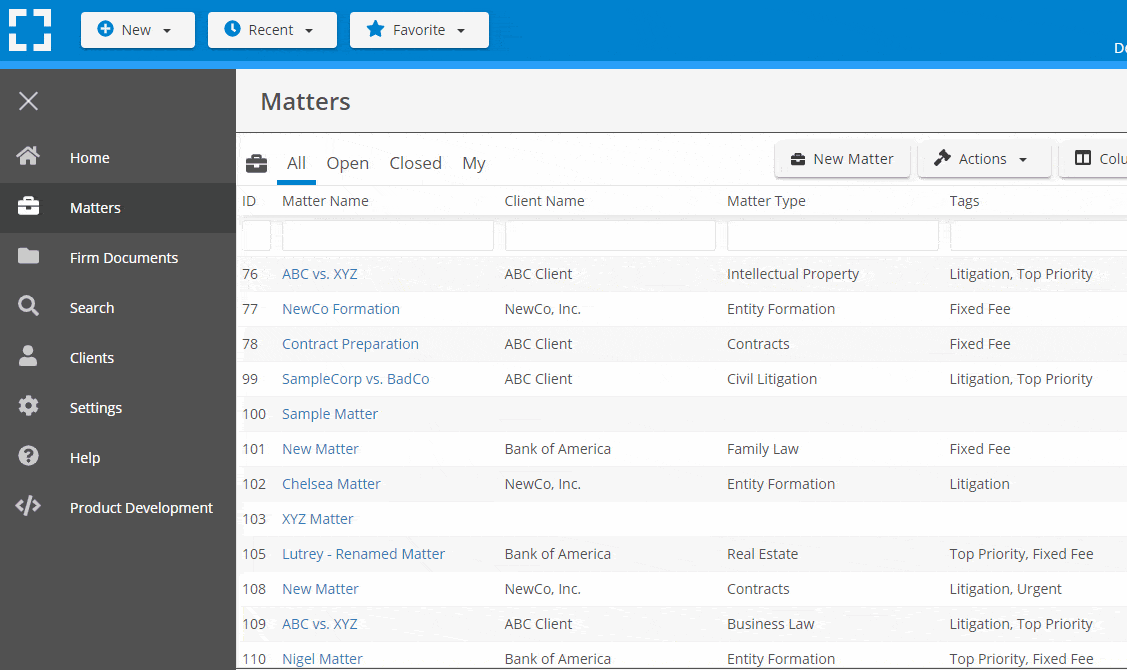
Go Beyond Basic Files & Folders
Supercharge your firm’s productivity with true DMS functions.
- Version Management
- Document Tagging & Profiling
- Document Check-Out / Check-In
- Microsoft Office Integration
- Automatic, Integrated OCR
- Convert Word Docs to PDF
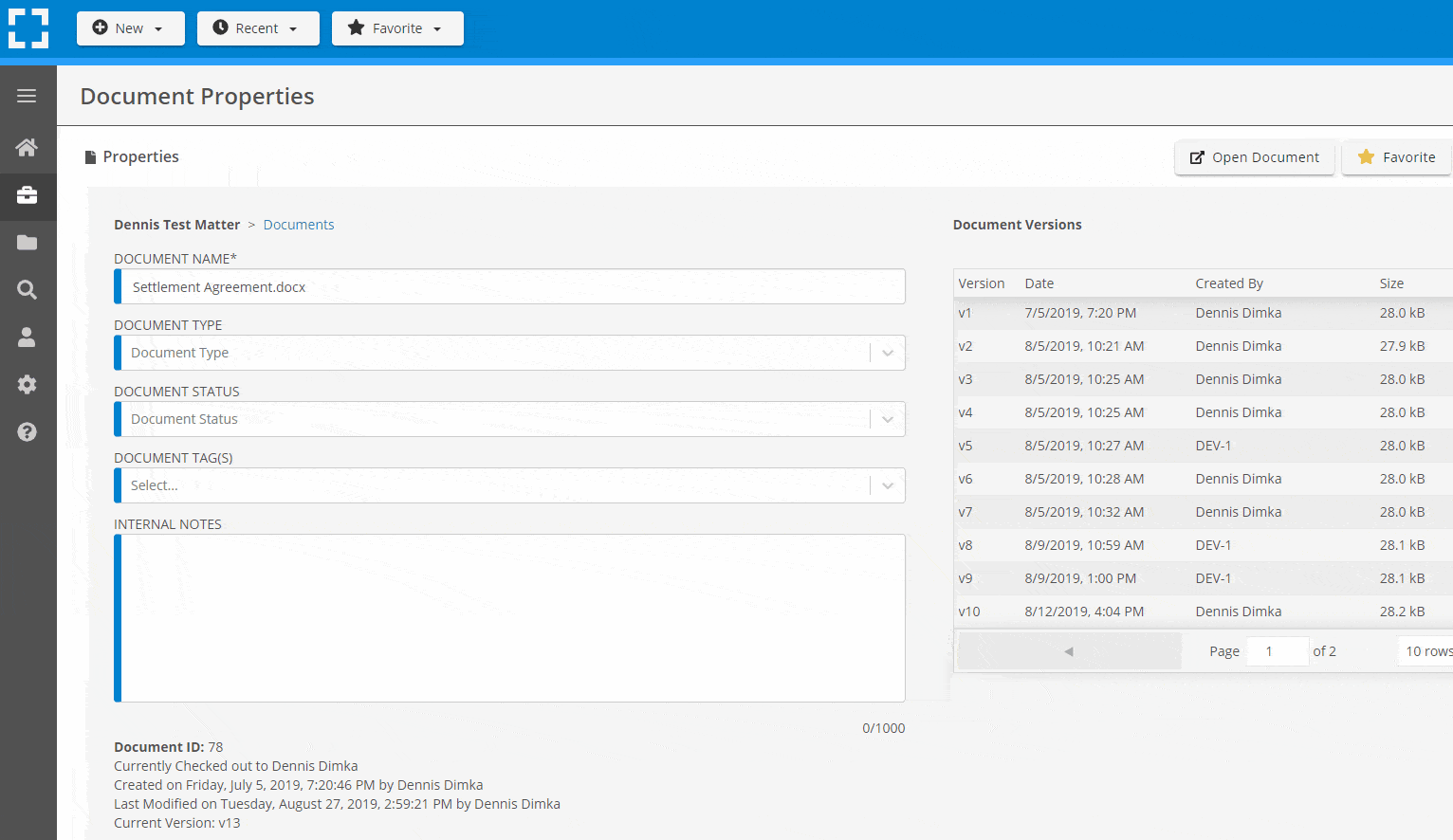
Search Everything
LexWorkplace is like Google for your law firm. Search across millions of pages, documents, folder email and notes in seconds. Refine your search by matter, document type, author and more.
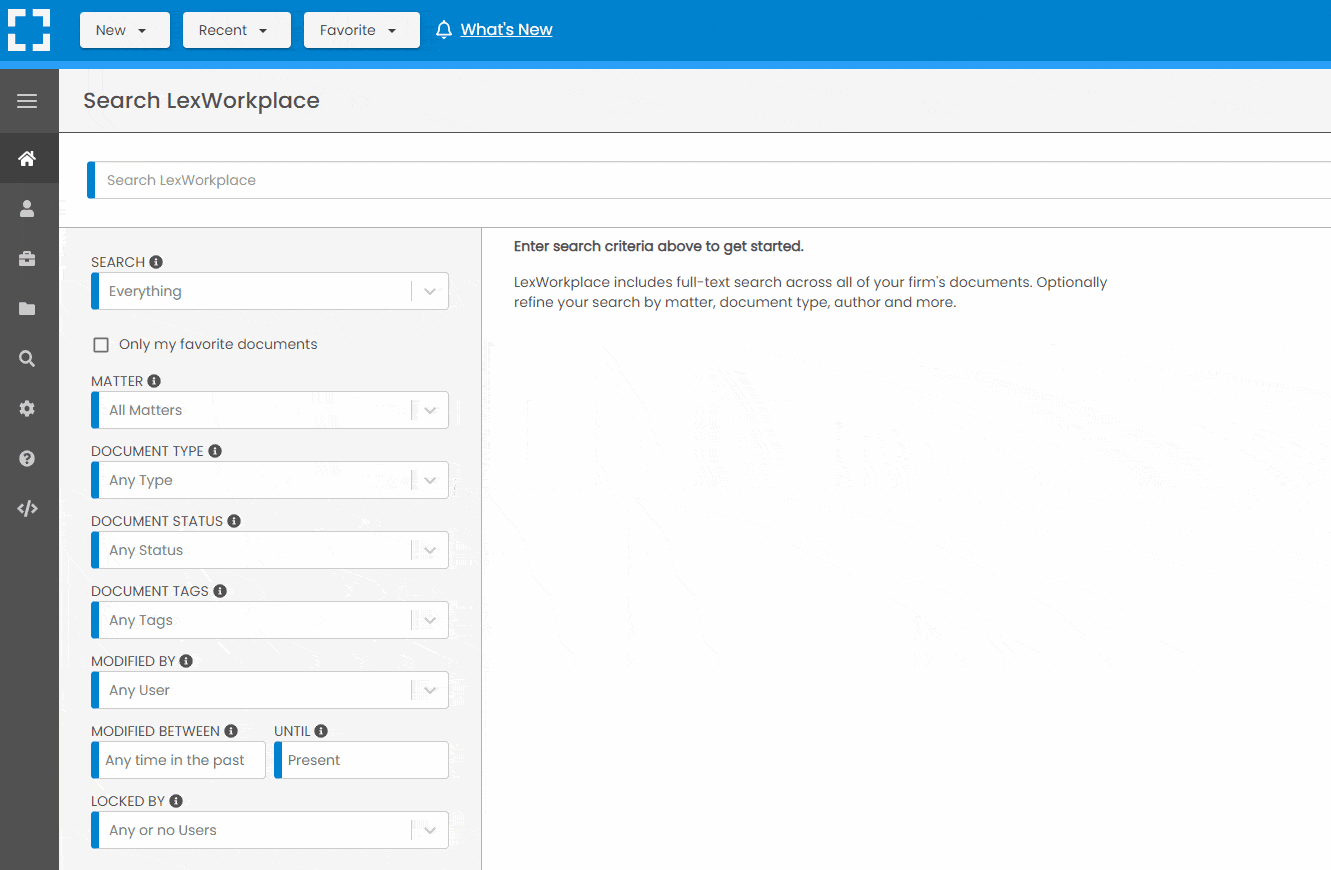
Search by…
- Client or Matter
- Document Type (Contract, Complaint, Order, etc.)
- Document Status (Draft, Final, etc.)
- Document Tags (Filed With Court, Fully Executed, etc.)
Outlook Integration + Comprehensive Email Management
Save emails to a matter without leaving Outlook. Saved emails are accessible to your entire team, organized and searchable.
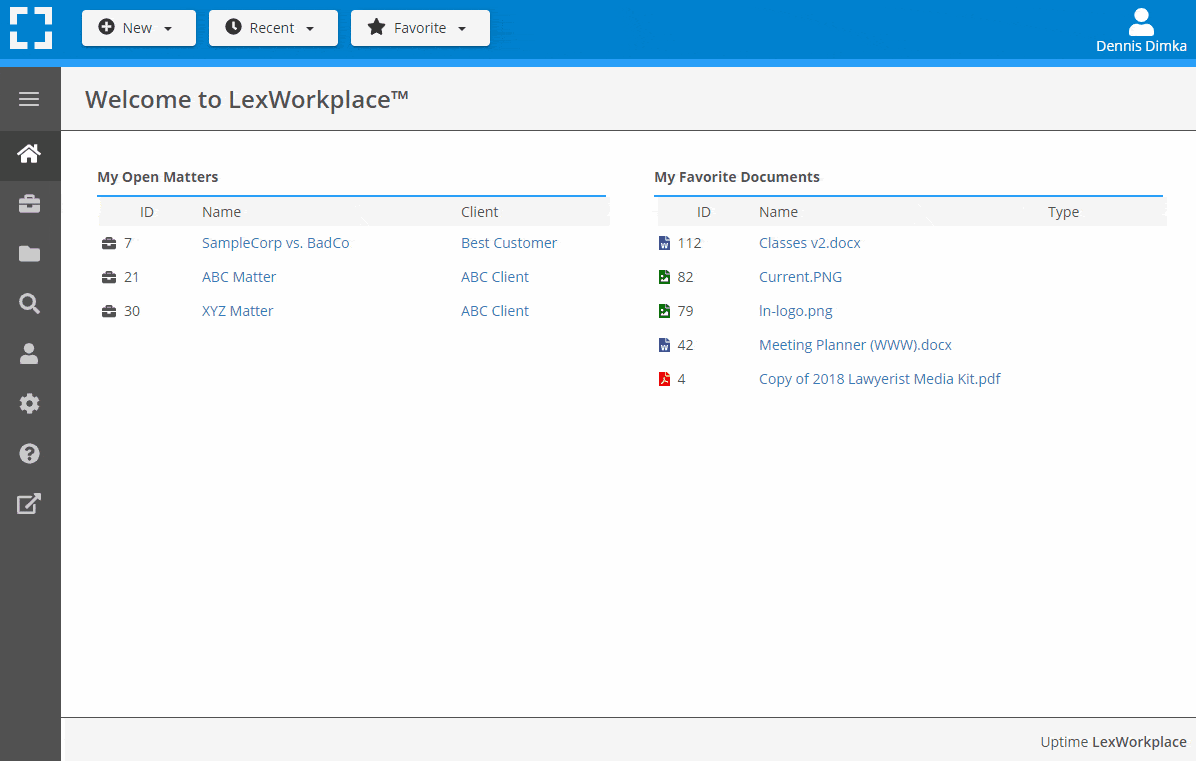
- Outlook Add-In that Works With Windows and Macs
- Save Entire, Original Email to a Matter in a LexWorkplace
- Email De-Duplication
- Organize Emails into Folders, Subfolders
Works with Windows and Macs
All of LexWorkplace is compatible with both Windows and Mac computers.
Next Steps
See What Clients Have to Say
Lawyers love LexWorkplace. See how the system streamlined one lawyer’s practice.
Watch the 5-Minute Demo
See LexWorkplace in action in our quick 5-minute overview and demonstration.
Or, if you want a one-on-one demo, or want to talk about LexWorkplace for your firm, schedule a call or demo below.
You Might Also Like
August 19, 2025
AI for Legal Documents: Top Tools Law Firms Use To Draft, Review, and Manage Faster
Struggling with slow legal document…
August 12, 2025
Why Law Firms Can’t Afford to Delay DMS Migration — And How to Switch Smoothly
Tired of costly, stressful tech…
June 23, 2025
Role-Specific Benefits of Document Management Software for Law Firms
Legal document management software…
Want More Legal Technology Tips?
Subscribe to Uptime Legal to get the latest legal tech tips and trends, delivered to your inbox weekly.
